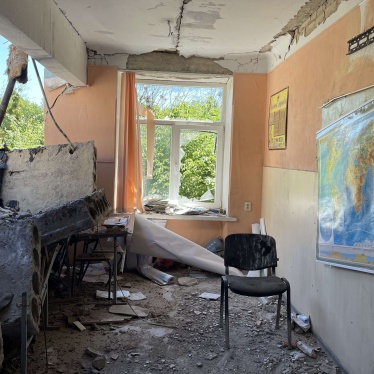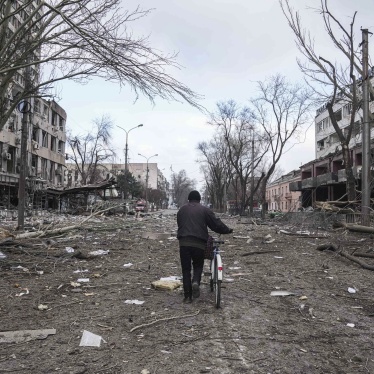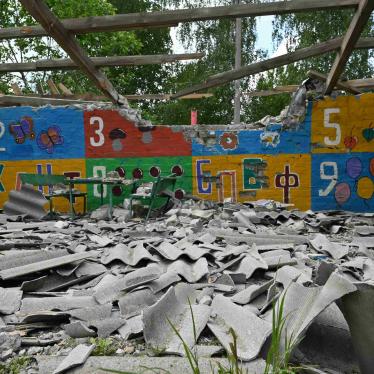The war in Ukraine has been devastating for the country’s children, particularly those in the most vulnerable situations, including children without parental care, children with disabilities, children at risk of family separation, those residing in residential institutions, as well as those who have been evacuated from such institutions during the war.
|
Protecting children’s rights in the humanitarian response Children urgently need the support and care of trusted adults to navigate the traumatic experiences they are going through. Placing children in institutions, both in Ukraine and other host countries, infringes their rights and goes against their best interests. The Government of Ukraine, along with international partners, should establish a tracking, family tracing and reunification mechanism for all children connected to the care system, including those currently outside of Ukraine, ensuring that all returns are planned with an assessment of the best interests of the children with a view to avoiding their re-institutionalisation. This should lay the groundwork for a reformed care and protection system. |
An extensive body of evidence clearly shows that residential institutions are harmful to children.[1] In its opinion on Ukraine’s application for EU membership, the European Commission stated that “Ukraine has one of the highest rates of child institutionalisation in the world (ca. 1.5% of all children), which is a serious concern and needs to be tackled as a matter of urgency.”[2] Prior to the war, over 90% of institutionalised children in Ukraine had at least one living parent with parental rights, and nearly half were children with disabilities.[3] These children were exposed to the harm, neglect and abuse that are common practice within institutional systems.[4] Recent reports have highlighted the severe risk of harm and human rights violations experienced by this group of children during the war[5] and the urgency of the need to remove them from institutions and provide support for family and community care.[6]
We welcome the response of the Government of Ukraine which, as part of its EU accession process, has committed to prioritising “the right of every child to live in a family, healthy growth and development, provision of necessary social services, as well as access to quality inclusive education in the community.”[7]
As international and national NGOs with expertise in child protection, disability inclusion and human rights and many years of experience working in Ukraine, we call on the Government of Ukraine and its international partners to implement the following recommendations on the development of an inclusive child protection and care system. We stand ready to support the Government of Ukraine and its international partners in the implementation of these recommendations.
Recommendations for the Government of Ukraine
The Government of Ukraine has rightly been commended for continuing to explore how to improve its child protection system, even during a brutal conflict. Building on this momentum and political will, we call on the Government of Ukraine to embrace a unified vision for its child protection and care system.
We call on the Government of Ukraine to formulate a single national care reform strategy, with a strong mandate backed up by legislation, that entails a full transformation of the care system for children and an end to the use of residential institutions. This should be accompanied by an action plan with an allocated budget, delivered through a coordinated mechanism with a single focal point, and should involve all relevant ministries and authorities, as well as civil society organisations, donor representatives and child protection experts.
This strategy should:
- Include all groups of children in the care system, including children with disabilities and children institutionalised in special boarding schools.
- Ensure that children (starting with the youngest as a matter of urgency) are deinstitutionalised and transitioned to family and community-based care.
- Prioritise the prevention of family separation, through direct financial assistance to families, reform of the family court system in line with international child rights frameworks, and the development of support services to help children live well in families. This should include psychosocial support, inclusive education and health care, support for care leavers, and a strong social service workforce to deliver these services.
- Be designed to end the use of residential institutions for children in Ukraine and prohibit the allocation of funding for the reconstruction or refurbishment of such institutions; where this funding is already allocated, it should be ringfenced and go towards the prevention of family separation and the transition of institutions into community assets, in line with UNCRPD guidelines, which should link with existing services and networks in the community[8] - as well as support for kinship care, the development of family-based alternatives such as foster care, and domestic adoption.
- Include all residential institutions, including those under the responsibilities of the Ministry of Social Policy, Ministry of Health, Ministry of Education and Science, Ministry of Sport and Ministry of Defence, as well as Oblast and local Municipalities.
- Include clear and comprehensive indicators, and robust monitoring and evaluation mechanisms, to assess the needs of each individual child and provide quality case management, as well as a plan for the sustainable funding of the process.
- Include an independent legislative and policy review of the previous Ukrainian child protection and care system, based on relevant human rights instruments and international policy frameworks, to identify and address any existing shortcomings.
- Establish a steering committee that includes civil society organisations, representatives of the relevant ministries and regional authorities, children, families, people with disabilities and their representative organisations, which should be actively involved in the design, implementation and ongoing monitoring of the care reform process.
- Include information campaigns, conducted at national and local levels, to raise awareness of why care reform is needed and to promote the creation of inclusive services in each community.
- Be informed by up-to-date data, disaggregated by age, gender, disability and support needs, on all children connected to the care system, including those currently outside of Ukraine.
- Ensure that national and Oblast level financing and procurement initiatives related to service provision are coordinated and that local capacity development is fully supported and sustainable.
Recommendations for international partners
We call on Ukraine’s international partners, including United Nations multilateral agencies, the EU, international financial institutions, partner governments, donor agencies and private sector investors to:
- Dedicate long-term, sustainable funding towards supporting Ukraine’s care reform process.
- Support the Government of Ukraine in the development of a national strategy for care reform, as outlined above, and coordinate the international donor community to ensure that all international funding for care reform goes through the coordinated mechanism responsible for its implementation.
- Prioritise funding to support families to care for their own children, to develop inclusive, family and community-based care services, and to strengthen the social service workforce required to deliver these services.
- Ensure continued support for children who have been evacuated from Ukraine to receive quality, family and community-based care in host countries, and ensure that they are not re-institutionalised on their return to Ukraine.
- Publicly commit to support the Government of Ukraine in line with these principles and prohibit the allocation of international funding towards the reconstruction or refurbishment of residential institutions.
Specific Recommendations for the European Union
The President of the European Commission Ursula von der Leyen announced in February 2023 that the EU will allocate 10 million euros to support ‘’the design of a modern child care strategy” in Ukraine, in line with EU standards.[9] Support for the design of this strategy, in accordance with the recommendations outlined above, should form the beginning of a sustained partnership with Ukraine, as called for by the Swedish Presidency of the Council of the EU in June 2023, [10] helping Ukraine to achieve its objective of a stronger, more prosperous future inside the EU.
We call on the EU to:
- Act as a champion and catalyst for care reform for children in Ukraine.
- Ensure that the EU accession process includes the irreversible and enforceable commitment by the Government of Ukraine to put an end to the institutionalisation of children and move to a family and community-based care system.
- Support the Government of Ukraine in the development of a national care reform strategy and action plan, as outlined above, with an allocated budget and clear milestones and benchmarks, as part of Ukraine’s EU accession deliverables. This should be prioritised in the early stages of the accession process.
- Support the Government of Ukraine to establish centralised, robust child protection mechanisms - including tracking and information management systems for children deprived of family care. This should include those children currently outside of Ukraine, to ensure their safe, managed return to family- and community-based care.
- Allocate the necessary resources to the development of family and community-based care services for refugees from Ukraine in the border countries whose child protection systems have been severely impacted by both the economic crisis and the influx of refugees.
These recommendations have been endorsed by the following organisations and networks:
A Family for Every Orphan
Better Care Network
Disability Rights International
Eurochild
Family for Every Child
Global Social Service Workforce Alliance
Hope and Homes for Children
Humanitarian Development Partnerships
Human Rights Watch
International Social Service
Lumos
Missing Children Europe
Save the Children
SOS Children’s Villages International
Ukrainian Child Rights Network
World Without Orphans Europe
[1] https://www.thelancet.com/article/S2215-0366(19)30399-2/fulltext
[2] https://neighbourhood-enlargement.ec.europa.eu/system/files/2022-06/Ukraine%20Opinion%20and%20Annex.pdf
[3] https://www.hrw.org/news/2023/03/13/ukraine-perils-war-children-institutions
[4] https://bettercarenetwork.org/sites/default/files/2022-11/unicef_iss-report_on_alternative_care_system_in_ukraine-final.pdf
[5] https://www.ohchr.org/en/statements/2022/10/un-experts-call-urgent-action-protect-ukrainian-children-disabilities
[6] Ibid
[7] https://www.kmu.gov.ua/en/news/minsotspolityky-zakhyst-prav-ukrainskykh-ditei-ie-priorytetom-u-spivpratsi-ukrainy-ta-ievropeiskoho-soiuzu
[8] United Nations Committee on the Rights of Persons with Disabilities: Guidelines on Deinstitutionalisation, including in emergencies https://www.ohchr.org/en/documents/legal-standards-and-guidelines/crpdc5-guidelines-deinstitutionalization-including
[9] https://neighbourhood-enlargement.ec.europa.eu/news/statement-president-von-der-leyen-joint-press-conference-ukrainian-president-zelenskyy-2023-02-02_en
[10] https://swedish-presidency.consilium.europa.eu/media/ymkph14r/declaration-on-protecting-children-in-ukraine-and-in-the-european-union.pdf







